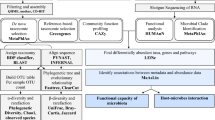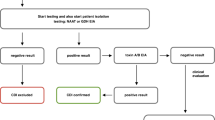Abstract
Background and Aims
Fecal microbiota transplantation (FMT) has become the cornerstone in management of recurrent Clostridium difficile infection (RCDI) in adults. However, data on efficacy, safety, long-term outcomes, and microbiota alterations are limited in elderly patients (>65 years).
Methods
Twenty-nine consecutive elderly patients with RCDI underwent FMT with combined jejunal and colonic method and monitored for long-term outcomes. Fecal samples from five elderly RCDI patients (G65) were subjected to genomic analysis before and after FMT, and microbiota changes were compared with matched RCDI patients below 65 years (L65).
Results
FMT resulted in marked improvement in all clinical parameters, including abdominal pain, bloating, and diarrhea in all elderly RCDI patients. Fecal C. difficile toxin was positive in all 29 patients and turned negative in all 27 patients, who agreed to undergo this test after FMT. Statistically significant improvement in leukocytosis was noted (p < 0.05). Only adverse events reported were transient mild fever (2/29) and bloating (3/29). Long-term follow-up over 25.4 ± 12.8 months did not reveal any additional adverse events or RCDI recurrence. Genomic analysis suggested that overall microbiota diversity increased post-FMT in elderly RCDI patients. However, this response was less robust than the younger group. While Firmicutes did not change markedly, Proteobacteria decreased significantly in post-FMT samples in elderly RCDI patients.
Conclusions
These observations suggest that FMT in elderly patients with RCDI appears to be highly efficacious with no recurrence of infection over long-term follow-up. Alterations in microbiota in this group of patients are characterized by less robust increase in microbial diversity and marked reduction in phylum Proteobacteria.


Similar content being viewed by others
References
Lessa FC, Yi Mu, Bamberg WM, et al. Burden of Clostridium difficile infection in the United States. N Engl J Med. 2015;372:825–834.
Garg S, Mirza YR, Girotra M, et al. Epidemiology of Clostridium difficile-associated disease (CDAD): a shift from hospital-acquired infection to long-term care facility-based infection. Dig Dis Sci. 2013;58:3407–3412.
Khanna S, Pardi DS, Aronson SL, et al. The epidemiology of community-acquired Clostridium difficile infection: a population-based study. Am J Gastroenterol. 2012;107:89–95.
Rodriguez C, Korsak N, Taminiau B, et al. Clostridium difficile infection in elderly nursing home residents. Anaerobe. 2014;30:184–187.
Zapata HJ, Quagliarello VJ. The microbiota and microbiome in aging: potential implications in health and age-related diseases. J Am Geriatr Soc. 2015;63:776–781.
Minino AM, Xu J, Kochanek KD. National Vital Statistics Reports. Vol 59, number 2. Centers for Disease Control and Prevention (CDC). http://www.cdc.gov/nchs/data/nvsr/nvsr59/nvsr59_02.pdf.
Drekonja D, Reich J, Gezahegn S, et al. Fecal microbiota transplantation for Clostridium difficile infection: a systematic review. Ann Intern Med. 2015;162:630–638.
Dutta SK, Girotra M, Garg S, et al. Efficacy of combined jejunal and colonic fecal microbiota transplantation for recurrent Clostridium difficile infection. Clin Gastroenterol Hepatol. 2014;12:1572–1576.
Walia R, Garg S, Song Y, et al. Efficacy of fecal microbiota transplantation in 2 children with recurrent Clostridium difficile infection and its impact on their growth and gut microbiome. J Pediatr Gastroenterol Nutr. 2014;59:565–570.
Ravel J, Gajer P, Abdo Z, Schneider GM, Koenig SS, et al. Vaginal microbiome of reproductive-age women. Proc Natl Acad Sci USA. 2011;108:4680–4687.
Fadrosh DW, Ma B, Gajer P, et al. An improved dual-indexing approach for multiplexed 16S rRNA gene sequencing on the Illumina MiSeq platform. Microbiome. 2014;2:6.
Song Y, Garg S, Girotra M, et al. Microbiota dynamics in patients treated with fecal microbiota transplantation for recurrent Clostridium difficile infection. PLoS ONE. 2013;8:e81330.
Masella AP, Bartram AK, Truszkowski JM, et al. PANDAseq: paired-end assembler for illumina sequences. BMC Bioinformatics. 2012;13:31.
Nelson MC, Morrison HG, Benjamino J, et al. Analysis, optimization and verification of Illumina-generated 16 s rrna gene amplicon surveys. PLoS ONE. 2014;9:e94249.
Caporaso JG, Kuczynski J, Stombaugh J, et al. QIIME allows analysis of high-throughput community sequencing data. Nat Methods. 2010;7:335–336.
White JR, Nagarajan N, Pop M. Statistical methods for detecting differentially abundant features in clinical metagenomic samples. PLoS Comput Biol. 2009;5:e1000352.
Kassam Z, Lee CH, Yuan Y, Hunt RH. Fecal microbiota transplantation for Clostridium difficile infection: systematic review and meta-analysis. Am J Gastroenterol. 2013;108:500–508.
Gough E, Shaikh H, Manges AR. Systematic review of intestinal microbiota transplantation (fecal bacteriotherapy) for recurrent Clostridium difficile infection. Clin Infect Dis. 2011;53:994–1002.
Emanuelsson F, Claesson BE, Ljungstr ML, et al. Faecal microbiota transplantation and bacteriotherapy for recurrent Clostridium difficile infection: a retrospective evaluation of 31 patients. Scand J Infect Dis. 2014;46:89–97.
Rubin TA, Gessert CE, Aas J, et al. Fecal microbiome transplantation for recurrent Clostridium difficile infection: report on a case series. Anaerobe. 2013;19:22–26.
Mattila E, Uusitalo-Seppala R, Wuorela M, et al. Fecal transplantation, through colonoscopy, is effective therapy for recurrent Clostridium difficile infection. Gastroenterology. 2012;142:490–496.
Brandt LJ, Aroniadis OC, Mellow M, et al. Long-term followup of colonoscopic fecal microbiota transplant for recurrent Clostridium difficile infection. Am J Gastroenterol. 2012;107:1079–1087.
Kim KA, Gu W, Lee IA, et al. High fat diet-induced gut microbiota exacerbates inflammation and obesity in mice via the TLR4 signaling pathway. PLoS ONE. 2012;7:e47713.
Zapata HJ, Quagliarello VJ. Microbiota and microbiome in aging: potential implications in health and age-related diseases. J Am Geriatr Soc. 2015;63:776–781.
Magrone T, Jirillo E. The interaction between gut microbiota and age-related changes in immune function and inflammation. Immun Ageing. 2013;10:31.
Drago L, Toscano M, Rodighiero V, et al. Cultivable and pyrosequenced fecal microflora in centenarians and young subjects. J Clin Gastroenterol. 2012;46:S81–S84.
Biagi E, Candela M, Turroni S, et al. Ageing and gut microbes: perspectives for health maintenance and longevity. Pharmacol Res. 2013;69:11–20.
Shahinas D, Silverman M, Sittler T, et al. Toward an understanding of changes in diversity associated with fecal microbiome transplantation based on 16S rRNA gene deep sequencing. mBio. 2012;3:e00338-12. doi:10.1128/mBio.00338-12.
Weingarden A, González A, Vázquez-Baeza Y, et al. Dynamic changes in short- and long-term bacterial composition following fecal microbiota transplantation for recurrent Clostridium difficile infection. Microbiome. 2015;3:10.
Hamilton MJ, Weingarden AR, Unno T, et al. High-throughput DNA sequence analysis reveals stable engraftment of gut microbiota following transplantation of previously frozen fecal bacteria. Gut Microbes. 2013;4:125–135.
Wang W, Chen L, Zhou R, et al. Increased proportions of Bifidobacterium and the Lactobacillus group and loss of butyrate-producing bacteria in inflammatory bowel disease. J Clin Microbiol. 2014;52:398–406.
Machiels K, Joossens M, Sabino J, et al. A decrease of the butyrate-producing species Roseburia hominis and Faecalibacterium prausnitzii defines dysbiosis in patients with ulcerative colitis. Gut. 2014;63:1275–1283.
Antharam VC, Li EC, Ishmael A, et al. Intestinal dysbiosis and depletion of butyrogenic bacteria in Clostridium difficile infection and nosocomial diarrhea. J Clin Microbiol. 2013;51:2884–2892.
Acknowledgments
This study was supported by the Gastroenterology Research Fund, Division of Gastroenterology, Department of Medicine, Sinai Hospital of Baltimore, Baltimore, MD (Contributors: Weinberg Foundation, Eric Cowan Fund, Friedman & Friedman Law Firm Fund through their grants to Drs. Dutta and Girotra), and the Institute for Genome Sciences, University of Maryland, Baltimore, MD.
Author contributions
Mohit Girotra, Shashank Garg and Rohit Anand were involved in study concept and design, acquisition of data, collection and storage of samples, analysis and interpretation of data, review of literature, and drafting of manuscript and participated in patient interviews. Yang Song performed the microbiota genomic analysis and analysis and interpretation of data and drafted the microbiota section of the manuscript. Sudhir Dutta was involved in study concept and design, critical revision of the manuscript for important intellectual content, obtained funding, administrative and material support and study supervision, performed the endoscopic procedures, and was in-charge of patient care and the study.
Author information
Authors and Affiliations
Corresponding author
Ethics declarations
Conflicts of interest
None.
Electronic supplementary material
Below is the link to the electronic supplementary material.
Rights and permissions
About this article
Cite this article
Girotra, M., Garg, S., Anand, R. et al. Fecal Microbiota Transplantation for Recurrent Clostridium difficile Infection in the Elderly: Long-Term Outcomes and Microbiota Changes. Dig Dis Sci 61, 3007–3015 (2016). https://doi.org/10.1007/s10620-016-4229-8
Received:
Accepted:
Published:
Issue Date:
DOI: https://doi.org/10.1007/s10620-016-4229-8




